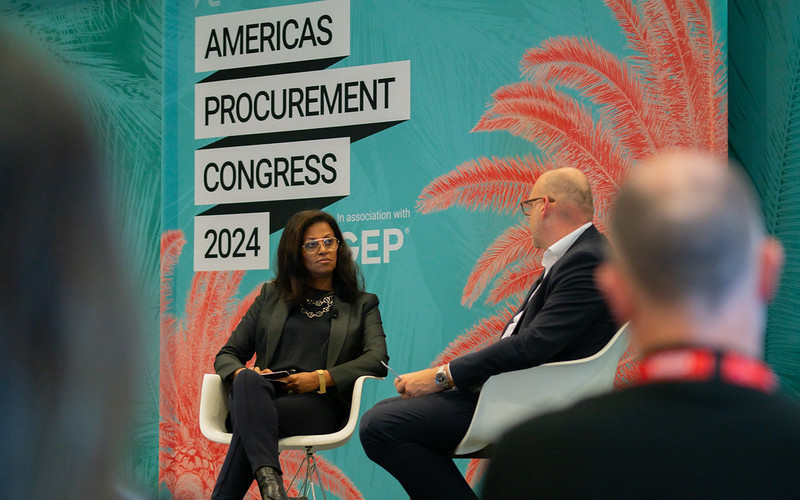The Dispatch is our blog series dedicated to unpacking trends and key insights from the premier events in the procurement space. In this post, we will focus on the 2024 Americas Procurement Congress and what our key learnings from the event are.
What is Americas Procurement Congress?
Held annually in Miami, the Procurement Leaders Americas Procurement Congress brings together CPOs, procurement professionals, and industry thought leaders to discuss the latest trends and challenges in procurement.
The 2024 APC featured sponsors from across the procurement technology landscape and over 55 speakers covering a variety of topics looking ahead to 2030 and trying to answer the question “how do we get the next six years right?”
Below we analyze the major themes from the show, along with our key takeaways.
Theme 1: Procurement Innovation & Technology
Not surprisingly, 40% of the content at Americas Congress had a strong focus on leveraging tools and technologies to transform procurement processes, including AI, data management, and automation. Our analysis found that these sessions followed one of the following themes:
- Digital Transformation in Procurement (streamlining the tech stack and broader transformation journeys)
- Leveraging Data & AI (including using AI in workflows and the importance of data as a foundation for AI)
As we’ve written about on our blog, AI is generating a ton of hype at the moment and procurement teams are looking for ways the technology can drive transformational change. Prior to the beginning of the show, there was an invite-only “AI Forum” for CPOs.
Our key takeaway: generative AI is transforming procurement into a strategic powerhouse. Imagine procurement teams wielding AI to unlock deeper supplier insights, automate repetitive tasks, and generate creative cost-saving solutions. This frees them to focus on building strong supplier relationships and crafting sustainable sourcing strategies, ultimately driving business growth and a competitive edge.
Theme 2: Supplier Management & Collaboration
24% of the conference’s content highlighted the importance of building strong relationships with suppliers to achieve success. Several sessions focus on topics like supplier onboarding, risk management, and collaboration.
Our key takeaway: Effective supplier management and collaboration are crucial for procurement leaders. By fostering strong relationships with suppliers, procurement teams can ensure a reliable flow of goods and services, reduce costs through joint process optimization, and even co-develop innovative products. This translates to a more resilient supply chain, increased profitability, and a competitive edge for the entire organization.
Theme 3: Sustainability in Procurement
Sustainability remains a hot topic, with 20% of the content focusing on reducing emissions and collaborating with suppliers for a more sustainable supply chain.
This continues to be a key theme as PA consults with its members on their areas of need. For a deeper dive on the turnkey solutions within our MRO program to help organizations reduce and manage energy and water utilization, minimize waste generation, and improve air quality, watch this on-demand webinar, “Sustainability Insights”.
Our key takeaway: Procurement teams are quietly weaving a powerful ESG thread into the fabric of their companies. Their control over spending empowers them to choose suppliers with strong social practices, minimize environmental impact through responsible sourcing, and drive ethical behavior throughout the supply chain. This holistic approach positions procurement as a key player, not just in cost savings, but also in building a sustainable and socially responsible organization.
Theme 4: Supply Chain Resiliency
Several sessions—16% of the agenda—addressed how to build strong and resilient supply chains in the face of recent disruptions, geopolitical uncertainty, and a focus on sustainability. Sessions in this track included topics like:
- Reshoring, Nearshoring or Friend-Shoring: What is the Future of Global Supply Chains?
- Securing Supply Chain Resiliency Amid Geopolitical Uncertainty
- De-Risking Your Supply Chain
- Strategies for Building a More Resilient Supply Chain
Recently featured on our blog was our post calling out 5 Signs That You Are Not in Control of Your Supply Chain, which is a helpful read for procurement teams looking to deliver quantifiable, value-add solutions to their companies.
Our key takeaway: by building a resilient supply chain, companies become shock absorbers, able to weather disruptions like material shortages, political instability, or natural disasters. This translates to a stronger competitive edge: uninterrupted production, happier customers, and ultimately, a more secure financial future.
- CATEGORIES
- Industry Trends

